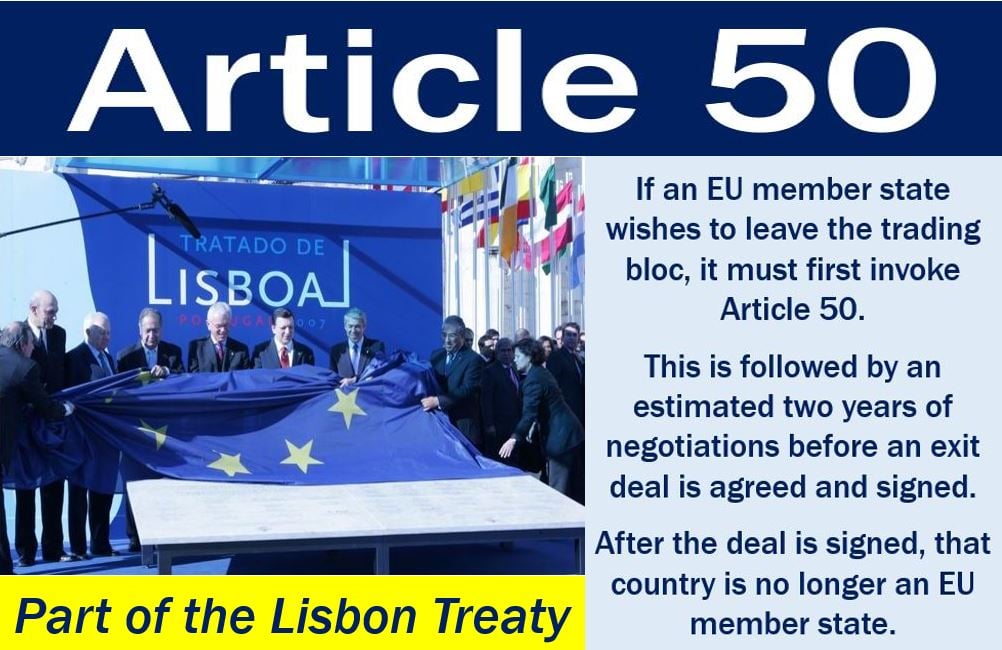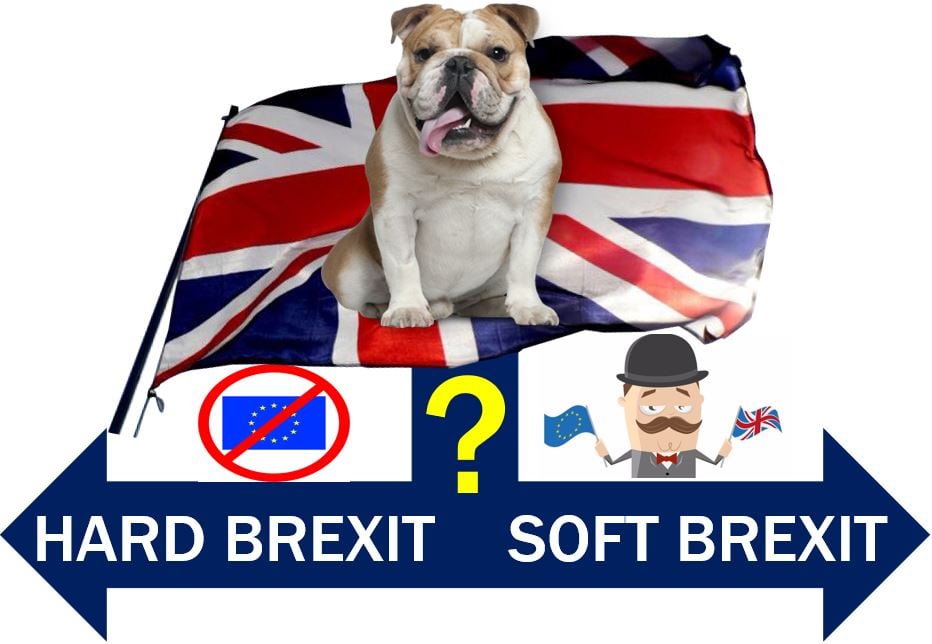Article 50 is part of the 2007 Lisbon Treaty, which became European Union law in December 2009. The treaty emerged eight years after EU members started a process to make the trading bloc more democratic. Additionally, the heads of the member states wanted to make the EU more transparent and efficient.
The European Union is a political and economic union consisting of 28 member states.
Article 50 is a basic 5-point plan. Any member state can use the Article if it wishes to leave the European Union (EU). Lawyers describe it as an obscure, complicated, and vague clause.
Article 50 states that any EU member state can decide to leave the trading bloc. However, that state must do so in accordance with its own constitutional requirements.

Article 50 kicks off separation negotiations
On 23rd June, fifty-two percent of the British electorate voted for Brexit. Brexit stands for BRitain EXITing the EU.
Invoking Article 50 is Britain’s first step towards leaving the EU. The country will not have left until it has agreed and signed an exit deal with the EU. It could take several years before they reach a deal. In fact, some experts say that the whole process could take a decade.
The Lisbon Treaty says that the exit negotiations should be completed within two years of invoking Article 50.
British Prime Minister Theresa May invoked article 50 on 29th March 2017. Only time will tell how accurate the 2-year forecast for completion will be.
Britain had a referendum regarding EU membership in 1975. In that year, 67.2% of the voters chose to remain. Many people who voted to remain in 1975 voted to leave in 2016.
Most Brexit supporters in 2016 who supported remaining in 1975 say that the European Union has changed. The EU used to be just a trading bloc. However, it is now moving towards becoming one giant country.
Britons like the trading relationship that the UK has with the EU. However, most British citizens reject the idea of an ever-closer union of EU member states.
The UK is not the first member wishing to leave the EU. Greenland voted in 1985 to leave the then EEC (European Economic Community). Greenland is part of the Danish Realm. When Algeria became independent of France in 1962, it left the trading bloc.
However, Britain will be the first independent nation to leave the EU using Article 50.
After Article 50, then what?
Mrs. May will take one of two routes when negotiating Britain’s exit from the EU – Soft or Hard Brexit.
Soft Brexit
Soft Brexit refers to a gentle, semi-detached separation. With a Soft Brexit, the UK would retain some of the features that it currently has.
Britain would still have free access to the EU market. The EU, with 500 million consumers, is the world’s largest market in monetary value. China’s market has more consumers than the EU. However, the EU market is worth more money than China’s.
The UK would also maintain passporting rights. Passporting refers to the freedom that a financial institution has within an EU member state to operate across the whole Union. EU member states have passporting rights. Norway, Liechtenstein and Iceland, i.e. members of the European Economic Area (EEA), also have passporting rights.
Britain must keep its passporting rights for London to continue being Europe’s largest financial center.
With a Soft Brexit, the UK will have to sign up to the free movement of people. EU citizens will be able to enter and leave the UK freely. EU citizens will be able to live, study, or work in the UK with no special visas.
Citizens of the EU currently have the right to enter, leave, live, or work in the UK freely.
Hard Brexit
Hard Brexit refers to a total separation from the EU. A Hard Brexit would mean losing free access to the EU market. Additionally, the UK would lose its passporting rights. The country would no longer belong to the European customs union.
However, the British Government would regain total control of its borders. The Government would be able to decide under what conditions foreigners could visit the UK.

In fact, the Government would gain full independence in determining which foreigners could live, study, or work in the country.
British businesses would prefer a Soft Brexit. UK companies say that a Hard Brexit would devastate the economy and kill jobs.
Economists say that London would risk losing its leading position in Europe. London is currently the continent’s largest financial center.
The electorate, however, would probably prefer a Hard Brexit. Regaining border control was one of the main concerns among voters who chose Brexit. In fact, regaining border control was probably the voters’ main concern.
The EU insists that the UK cannot have both. If Britain wants EU market access, it must accept the free movement of people. Furthermore, the EU has also tied passporting rights to the free movement of its citizens.
Video – What is Article 50?
As this Guardian video explains, Article 50 is complicated and vague. No country has ever used Article 50 before.
